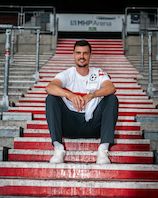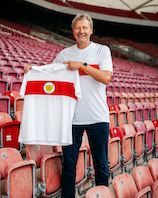Neatly laid out on the MHP Arena pitch are several VfB shirts from years gone by, along with old issues of ‘Stadion aktuell’ – the stadium magazine – and pennants from particularly memorable matches. Guido Buchwald, a 1990 World Cup winner and Bundesliga champion with VfB in 1984 and 1990, and current player Pascal Stenzel, who lifted the DFB Cup in 2025, can only look on in amazement. The 64-year-old honorary captain and 29-year-old defender are part of VfB’s past and present, but club historian Dr. Florian Gauß has a surprise in store: It is exactly 100 years to the day since VfB first wore the famous red hoop on their shirts. The perfect time, then, to bring together two players from different generations for a double interview!
Hello Guido and Pascal. Your respective football careers are associated with different decades. What would you have liked to experience from each other’s eras?
Guido: “In October and November, our penalty areas were often nothing more than sand and mud, which is why I’d prefer today’s grass pitches (laughs). It’s sensational that the lads are able to play on such well-maintained surfaces practically all year round. The second thing is dedicated football stadiums – no running tracks, but arenas that often hold 50,000 or 60,000 fans, with noise coming from every corner. That always excites me, even though we enjoyed great atmospheres at stadiums in our day.”
Pascal: “Because of my age, I wasn’t able to follow Guido’s era, but I mainly know about it from watching highlights on TV. My impression is that the focus was much more on football itself during his generation. I like that and I’d love to experience that myself. Nowadays, the overall package is much bigger, with many more departments involved, but obviously that all means full stadiums and enormous interest, which we’re pleased about and which makes it so special.”
Throughout the decades, one thing that has always set VfB apart is the red hoop. The club and its fans are celebrating 100 years of the famous hoop during the home game against Borussia Mönchengladbach. What does the hoop mean to you?
Guido: “For me, the hoop is the key distinguishing feature of VfB. When you think of our club and the many shirts we’ve had over the years, that connection immediately springs to mind. The hoop is a ‘brand’ that wasn’t created artificially, but has evolved through tradition and is very much alive today. It’s unique in its form.”
Pascal: “Before I played for VfB, I was aware of the hoop but only had a rough idea of its significance. Now it’s different: With every season I’ve been here, I’ve learned more about the club, its traditions, the people and the region. That identification is important to me and I think it’s special to be able to wear a jersey that so many people associate with so many stories, highs and lows. The hoop is part of VfB.”

Pascal, as a current player, what makes it really hit home that you’re playing for a club with such a rich tradition?
Pascal: “[The club’s] power, its size, its expectations. These are all things that set traditional clubs apart from others and things that you have to deal with, both in success and in failure. When I had the option of joining Stuttgart at the age of 23, I deliberately thought about it for a few days. VfB had just been relegated, it was a turbulent time. However, the discussions with the management were so positive that I decided to take the step and accept the challenge. I can now say I’ve experienced everything from the second division to the Champions League and winning the DFB Cup. It’s been an extraordinary journey.”
Guido, by winning the German title in 1984 and 1992, you and your team-mates played a major role in helping VfB establish its current status. To what extent were you aware of that at the time?
Guido: “Winning a title will always have a major impact at a club. At the time, I mainly noticed the number of people that came together in harmony across Stuttgart, and the number of fans we were able to bring happiness to through our triumphs. This was not just important for the region, but also strengthened VfB’s position far beyond Swabia. For a traditional club, it’s always important to add new success stories.”
A similar new chapter was written when the club reached the UEFA Champions League and won the DFB Cup last season. What are the reasons behind VfB’s development in recent years?
Guido: “It usually takes all individual pieces of the puzzle to come together, but in simple terms: For the most part, all is calm at VfB. The management team are pulling in the same direction so the club can do its job – and it’s doing it very well at the moment. Pascal mentioned earlier that he’s also been through other [more difficult] periods.”
Pascal: “Setbacks are normal in football. You can’t always be looking up. As a player, I try to focus on sport and block out certain distractions, but it’s clear that it’s easier and more fun in general when the environment is right. Under head coach Sebastian Hoeneß in particular, we’ve set out on a path that doesn’t hinge on individual games and results, but focuses on continued development. We want to keep improving, try to stay on the right track and work hard to achieve our goals.”
Guido: “And it’s clear for all to see. I get the impression that VfB are a team on the pitch again. That’s another key factor that allows us to look to the future with optimism. Every professional obviously wants to be in the starting XI, but they also have to recognise and accept their role. Sebastian Hoeneß and his coaching team are doing well at managing that.”

Has a good team spirit always set successful teams apart, both then and now?
Guido: “Definitely. When I think back to our World Cup win with West Germany in 1990, players wearing the number 18, 19 and 20 shirts were just as important as members of the squad who were playing more regularly. There was a high level of mutual respect, and every player did their best for the success of the team on that basis. The same can be applied at club level today: The best individual players and ‘stars’ will only be successful if they see themselves as part of a team and work for one another.”
Pascal, the first home game of the season is coming up. In Borussia Mönchengladbach, you’re facing a tough opponent at the MHP Arena. What are your goals for the new season?
Pascal: “Every day, I see how hard we’re working to achieve our goals, and the qualities we have in our ranks. It’s important that we show all that on the pitch and draw on it in different situations. If we manage to do that, we’re capable of having a good season and giving our fans plenty to cheer about.”
We’re celebrating 100 years of the red hoop, but what are your wishes for VfB in the next 10 years?
Guido: “I’d be delighted if we continue to harness the power of the city and the region, as well as the fans and the surrounding area, as consistently as we are at the moment. VfB, with its tradition and success, is one of the four biggest clubs in Germany in my opinion, but it’s a huge task, both in sporting and economic terms, to re-establish a permanent place in that category. That’s why the motto for the next few years is to keep working with humility and diligence, remain ambitious on the pitch and wear the red hoop with pride.”
Pascal: “I’d rather not think too big but stay in the here and now. We need to continue doing things that have made VfB strong over the past two or three years and take one step at a time. We need to do so as a community, along with our fans. The foundations in place here can’t be found in many other places in Germany. If we want to keep this up, I’d like VfB to remain calm and have the foresight to continue on the path they’ve set out on. Then the next 10 years could be really good.”